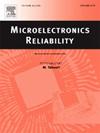提高光耦合器封装性能的Au-Pd-Ag合金焊线的微观结构与分析
IF 1.9
4区 工程技术
Q3 ENGINEERING, ELECTRICAL & ELECTRONIC
引用次数: 0
摘要
研究了光耦合器封装用金钯银合金键合线的微观结构特征及其形成机理。采用扫描电镜和能谱仪对含金20%、60%和99.99%的焊丝进行了分析。结果表明:含金60%的合金丝元素分布均匀,在结合界面处形成稳定层,显著提高了结合强度和可靠性;在加速老化试验中,包括金属间化合物高加速应力试验和高温贮存试验,合金丝表现出优异的耐老化性能,其生长遵循抛物线规律。优化Au和Pd含量可有效减缓金属间化合物(IMC)的形成,提高长期稳定性。此外,优化的合金成分通过改善Iceo和VF特性来提高光耦合器性能,同时降低生产成本。该研究为光耦合器封装提供了一种高性能的替代方案,并为合金键合线的微结构设计和层控制提供了见解,推动了电子封装技术的发展。本文章由计算机程序翻译,如有差异,请以英文原文为准。
Microstructure and analysis of Au-Pd-Ag alloy bonding wires for enhanced optocoupler packaging performance
This study investigates the microstructural characteristics and formation mechanisms in Au-Pd-Ag alloy bonding wires for optocoupler packaging. Bonding wires with different gold contents (20 %, 60 %, and 99.99 %) were analyzed using SEM and EDS. The results show that the alloy wire with 60 % gold content exhibits uniform elemental distribution and forms a stable layer at the bonding interface, significantly enhancing bonding strength and reliability. Under accelerated aging tests, including intermetalic compound highly accelerated stress test and high-temperature storage test, the alloy wire demonstrates excellent resistance to aging, with growth following a parabolic law. Optimizing the Au and Pd content effectively slows intermetallic compound (IMC) formation, improving long-term stability. Additionally, the optimized alloy composition enhances optocoupler performance by improving Iceo and VF characteristics while reducing production costs. This study provides a high-performance alternative for optocoupler packaging and offers insights into the microstructural design and layer control of alloy bonding wires, advancing electronic packaging technology.
求助全文
通过发布文献求助,成功后即可免费获取论文全文。
去求助
来源期刊

Microelectronics Reliability
工程技术-工程:电子与电气
CiteScore
3.30
自引率
12.50%
发文量
342
审稿时长
68 days
期刊介绍:
Microelectronics Reliability, is dedicated to disseminating the latest research results and related information on the reliability of microelectronic devices, circuits and systems, from materials, process and manufacturing, to design, testing and operation. The coverage of the journal includes the following topics: measurement, understanding and analysis; evaluation and prediction; modelling and simulation; methodologies and mitigation. Papers which combine reliability with other important areas of microelectronics engineering, such as design, fabrication, integration, testing, and field operation will also be welcome, and practical papers reporting case studies in the field and specific application domains are particularly encouraged.
Most accepted papers will be published as Research Papers, describing significant advances and completed work. Papers reviewing important developing topics of general interest may be accepted for publication as Review Papers. Urgent communications of a more preliminary nature and short reports on completed practical work of current interest may be considered for publication as Research Notes. All contributions are subject to peer review by leading experts in the field.
 求助内容:
求助内容: 应助结果提醒方式:
应助结果提醒方式:


